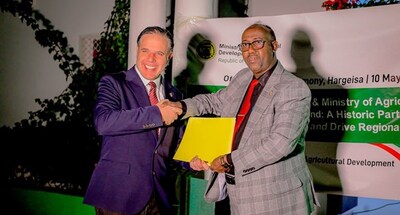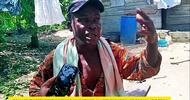May 10, 2025 | Hargeisa, Somaliland
A troubled agribusiness returns: African Food Security’s quiet expansion into Somaliland raises old alarms
By the Geopolitics Africa Investigative Desk
Today in Hargeisa, the Republic of Somaliland hosted a high-level delegation from African Food Security, a U.S.-based agribusiness led by CEO Allan Kessler, in a diplomatic ceremony at the Presidential Palace. President Abdirahman Mohamed Abdillahi (Irro), joined by key cabinet members, received the visitors as part of a bid to expand agricultural collaboration and investment.
But while the visit signals Somaliland’s openness to foreign partnerships, a closer examination of the company’s history raises serious concerns. Beneath the promises of food security and economic growth lie allegations of land grabbing, human rights violations, environmental damage, and financial mismanagement—particularly linked to the company’s operations in West and Central Africa.
A Legacy of Displacement and Environmental Harm
In 2018, under its previous name African Agriculture Inc., the firm secured a 25,000-hectare lease in Senegal’s Ndiaël wetland, displacing dozens of villages without meaningful consultation. The land was historically protected and critical to local pastoralist communities.
African Agriculture proceeded to clear and cultivate the land for alfalfa exports, diverting vital water from Lake Guiers—Senegal’s most important freshwater source. Tragically, three children drowned in unprotected irrigation canals built by the company. These incidents sparked widespread protests and international condemnation.
Financial Collapse and Delisting
Despite grand public claims of a $450 million valuation and African agricultural dominance, African Agriculture failed to deliver results. Workers in Senegal staged demonstrations after months without pay, while internal financial inconsistencies mounted.
By 2023, the company’s shares plummeted on NASDAQ, eventually leading to a delisting. The firm quietly rebranded as African Food Security, shifting its operations toward Cameroon and now Somaliland.
Corrupt Ties and Land Acquisition Deals
The company’s history is further complicated by its associations with controversial figures. Its largest early investor, Frank Timis, was involved in a Senegalese oil corruption scandal. Today, its land ventures in Central Africa include partnerships with Baba Danpullo, a Cameroonian tycoon accused of illegal evictions and land monopolization.
Such associations, critics warn, suggest a pattern of exploiting vulnerable regulatory environments and entering fragile economies under the guise of agricultural investment.
Somaliland’s Risk
While Somaliland urgently needs strategic investment and economic growth, experts caution that deals of this nature require transparency, safeguards, and local accountability mechanisms. The country cannot afford to replicate the painful experience of other African nations where large land deals led to dispossession, ecological degradation, and unfulfilled promises.
As African Food Security courts Somaliland’s leadership today, the public deserves clarity: Will this partnership bring food and opportunity—or repeat the extractive mistakes of the past?
--
Somali Magazine - People's Magazine | May 12, 2025
In partnership with U.S.-based African Food Security, the initiative aims to reduce food imports, support farmers, and turn Somaliland into a regional agricultural exporter
The Ministry of Agriculture in Somaliland has started a major new project worth $100 million to help grow more food in the country. This big project is being supported and carried out by a company from the United States called African Food Security, which works in agricultural development across Africa.
This agreement was officially signed by President Abdirahman Irro. The Minister of Agriculture, Mahmoud Egeh Yusuf, and the Deputy Minister, Mukhtar Haaji Muxumed Farah, made the public announcement during a press conference.
In their official statement, the Ministry explained that African Food Security sees Somaliland as an important location for farming. They believe that if farming improves, Somaliland could one day become a strong exporter of fruits, vegetables, and other agricultural goods—especially to countries like Saudi Arabia and others in the Gulf Cooperation Council (GCC), which includes nations like the United Arab Emirates, Qatar, and Kuwait.
During the announcement, President Irro said that increasing food production is one of the biggest goals of his government. He mentioned that too many people in Somaliland still suffer from hunger or lack access to enough food. Right now, most of the food eaten in Somaliland is imported from other countries, which makes it expensive and sometimes hard to get. Locally grown food is still too little to meet the needs of the population.
Several problems have made it difficult for farmers in Somaliland to grow enough food. These problems include:
- A lack of investment in the farming sector
- Not enough water due to frequent droughts
- Dry land and tough weather conditions
Because of these challenges, farming has not grown as much as it could. But officials believe that this new project will begin to solve some of these problems. They hope it will bring new ideas, better tools, and modern techniques to help farmers grow more food in a smarter way.
The Ministry said that African Food Security will not only provide money but also technical knowledge, equipment, and training to local farmers and agricultural workers. This support could lead to more jobs, better harvests, and a stronger local economy.
The project is also expected to focus on how to use water more efficiently, especially in areas where water is very limited. Using new technology for irrigation and farming could help produce more food even in dry places.
In the long term, the government hopes this partnership will help Somaliland become more self-reliant when it comes to food. Instead of depending heavily on food imports, the country could start producing more of its own food and even export some of it.
This project is one of the first major efforts by the new administration under President Irro to seriously invest in food and farming. Many citizens and farmers are hopeful that this move will bring positive change and reduce hunger across the region.
The government has promised to continue working with international partners and investors who are willing to help grow Somaliland’s agriculture sector. They believe that with the right support and planning, farming in Somaliland can become a strong pillar of the economy.
In conclusion, this $100 million agriculture project is seen as a big step toward a better future for Somaliland. It brings hope to farmers, families, and communities who have struggled with food shortages for years.













